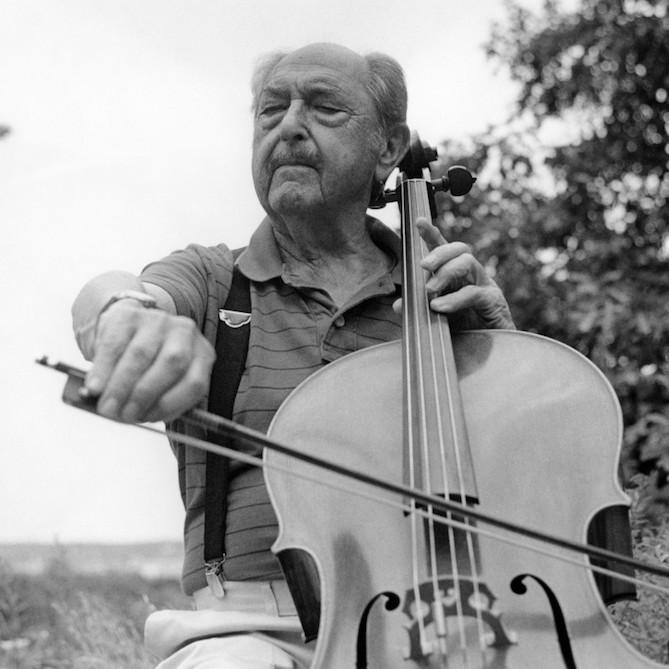
A Remembrance of Things Present
Elena Delbanco
In the aftermath of a grand celebration of Bernie’s 95th birthday, in Wellfleet, five years ago—a dinner for seventy five people—Bernie and I sat at the round, marble table so many of you may remember, facing the harbor. As guests had arrived and the house reverberated with laughter and conversation, he had lain in bed, telling us he was not feeling all that well and didn’t have the energy to get dressed. We told him he didn’t need to dress; it was a come-as-you-are party and his best bathrobe would be fine. And so, my father attended, making a grand entrance into the living room in his wheelchair, to applause and the beginning of a long night of toasts and merriment.
A fire burned, the room filled with friends. Martinis were served. With each passing moment, Bernie regained his social energy, talking to each person who came to sit at his side. There was music, there were stories and jokes and, at the end of the evening, Bernie felt well enough to play a Spanish folk tune for us—a performance we will never forget.
When all the guests had left, long past midnight, Bernie took a last sip of his champagne and asked, smiling slyly, “Well, that was a great party, but what’s being planned for my 100th?”
If he only knew!
In 2011, shortly after Bernie’s death, we—my husband and I—inherited the house in Wellfleet, which Bernie and my mother had designed and built in 1955. This was our family home, a place of rest and peace for Bernie between concert tours and long days of teaching. Here, he would cook and garden and practice hours a day in his studio downstairs, where the gorgeous views would not distract him.
The house in Wellfleet provided my parents great comfort, pride and pleasure for decades. In this small town, Bernie was a local hero. He drove around town in a 1954 Oldsmobile, V6—a tank which became a fixture of the annual Fourth of July parade. He wore his sailor’s cap and old clothes, going into town to do errands and work on his boat, down at the harbor. He loved fishing and talking with the Wellfleet fishermen to find out where the Blues or Stripers were running. He loved oysters and opened them with little regard for his hands, which often suffered deep gashes. Weather permitting, he sailed one of his boats every day. In fact, Bernie loved everything about the water except being IN it. Only once or twice did I see him swim.
Wellfleetians loved and respected him for being down to earth, for supporting the town and bringing music to the outer Cape by sponsoring a summer concert series which raised money for the local health services. Over the years, our home filled with cellists from around the world who came to study with him. Often, every bed was occupied and there were twelve at dinner, listening to Bernie’s stories, sharing thoughts on music and performance. His students played recitals at the Wellfleet Library, rehearsing for the greater world (Bernie always sat in the front row, eyes closed while he listened, registering small nods of approval or distress).
Late in life, my parents moved away from New York to become full time residents of Wellfleet. Both died there, at home—my mother in March of 2006 and Bernie five years later, in May of 2011. It had been Bernie’s oft expressed dream that my husband and I, our children and grandchildren would keep and cherish the house as he did, but after thirty years away from New England, our life was elsewhere.
We set to work organizing his music and papers, his photos and letters, planning the sale of his beautiful Countess of Stainlein and the rest of his collection. Through many months of sorting and archiving, we could feel Bernie’s presence everywhere. At times I thought I could hear him playing. I saw him at the head of the dining table or basking in the sun on the deck. His spirit, his voice, his music imbued every inch of the house. I felt that I could never live happily amidst all the memories; I would feel only loss.

Bernie with his grand-daughter Andrea, 1979
I was wrong. Over months, then years, I have come to find my father’s presence comforting. I realize that he and my mother will continue to share the house with us and I feel less loss, not more. Their company has become reassuring—a remembrance of things present.
Now, I listen to his music and work in his garden. I sit with him at the round table at cocktail hour. We drink a martini. My husband tells me a joke. Bernie laughs. I play his exquisite recording of Siciliana and feel joy. Bernie always said he wished he could see what we would do to the house after his death, when it became ours. I believe he can. He wanted so much to be at his 100th birthday celebration. I believe he is.
 Elena Delbanco has recently retired after teaching for twenty-seven years at the University of Michigan’s Gerald R. Ford School of Public Policy. Before moving to Ann Arbor, she worked at Bennington College in Vermont, where she and her husband, the writer Nicholas Delbanco, together with the late John Gardner, founded the Bennington Writing Workshops. Delbanco has long been engaged in the world of classical music. Elena’s first novel, The Silver Swan, was inspired by her musical father. Her father was the renowned cellist Bernard Greenhouse (of the Beaux Arts Trio), who owned the Countess of Stainlein ex-Paganini Stradivarius violoncello of 1707.
Elena Delbanco has recently retired after teaching for twenty-seven years at the University of Michigan’s Gerald R. Ford School of Public Policy. Before moving to Ann Arbor, she worked at Bennington College in Vermont, where she and her husband, the writer Nicholas Delbanco, together with the late John Gardner, founded the Bennington Writing Workshops. Delbanco has long been engaged in the world of classical music. Elena’s first novel, The Silver Swan, was inspired by her musical father. Her father was the renowned cellist Bernard Greenhouse (of the Beaux Arts Trio), who owned the Countess of Stainlein ex-Paganini Stradivarius violoncello of 1707.
Subjects: Artists



